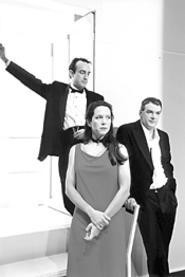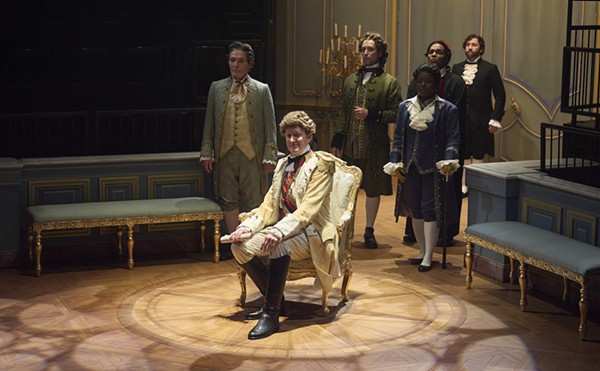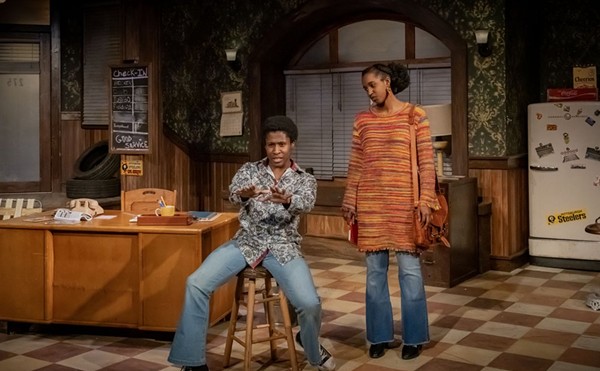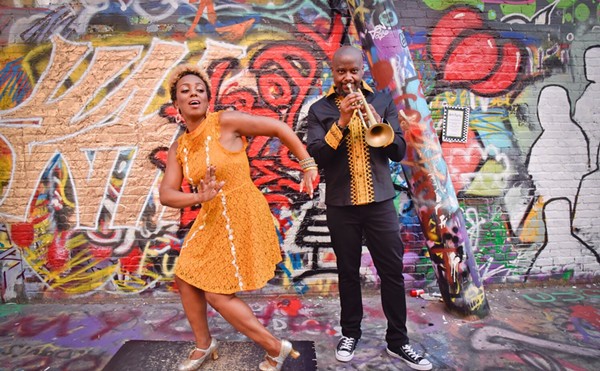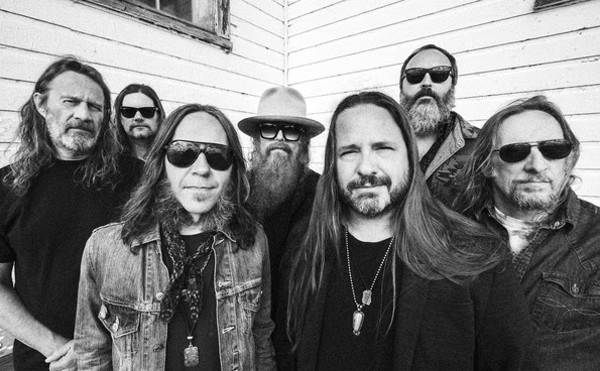The denizens of Shepard's The Late Henry Moss suck up rotgut to sustain their eternal vendettas. On the other side of the social scale, in Pinter's Betrayal, three gleaming manipulators imbibe expensive wine to lubricate their endless deceptions. One play is violent and brutal; the other disciplined and self-contained.
Suggested by Pinter's real-life affair, Betrayal is his most grounded and least allegorical work. It follows the Noël Coward template of the overcivilized upper class acting uncivilized. It is a poisoned comedy of manners that allows genuine pain to intrude on its elegance. Its story is that of a seven-year love triangle involving a publisher, his wife, and his best friend, a literary agent. Told straightforwardly, it would be just another tale of adultery. But Pinter relates it backwards, which gives it a fascinating effect akin to watching a shattered crystal ball reassemble itself and take us back to what caused its original crack.
The play's contained grace fits beautifully into the arena configuration of the Cleveland Play House's Baxter Stage. The production is tastefully designed by Pavel Dobrusky to suggest a plush, austere cage for the actors to stalk each other like graceful panthers.
Andrew May as the adulterous best friend shows himself to be the ideal Pinter actor, with his precise ability to reveal, through the slightest inflection, his innermost feelings beneath the polite banter. Paul Vincent Black, as the betrayed husband, brings a quixotic vulnerability to what could be an unsympathetic character. Anne Torsiglieri conveys fragility and toughness at the same time, bringing just the right translucent delicacy to the triangle.
This is perhaps director Peter Hackett's most stylish Play House production, marred only by the debatable technique of having an actor not in the scene witnessing the action. Though visually effective, this at times obfuscates some of the points of the story.
Nevertheless, the production has the beauty of fine porcelain. It ends on a moment of rueful tenderness, as the two lovers, on the cusp of an affair that will bring them much heartache, tentatively reach for each other's grasp, making the audience feel privy to future suffering.
Anyone who has ever cruised Shepardland will know what to expect from The Late Henry Moss, his two-year-old play making its Ohio premiere at Dobama Theatre. Shepard's works reflect an adolescence steeped in the deep cynicism of John Huston films, the camaraderie of John Wayne saddle epics, rock and roll aggression, and Samuel Beckett treatises on alienation. He rolls them all into this latest work with vigorous aplomb.
In film-noir tradition, the flashbacks come fast and thick, as two brothers investigate their abusive, alcoholic father's mysterious death. Throughout, the father and his mystical Indian girlfriend are seen performing drunken seduction dances out of David O. Selznick's western passion play Duel in the Sun.
The work is dizzying in its changing emotional colors. With their father's body onstage, the family members weather a continuing cycle of violence, as the brothers play out old recriminations and humiliating attacks on one another. Then the evening takes a fascinating spiritual turn when the girlfriend metamorphoses into an all-knowing angel-of-death figure out of Tennessee Williams.
Shepard's dialogue is astounding in its all-encompassing vernacular, ranging from private-eye machismo to fruity Freudian self-consciousness to clichéd Western bromides.
Director Russ Borski, noted for his evocative set designs, creates a production of sweat and passion. The boozy atmosphere is so genuine and intense that the audience becomes drunk by osmosis.
As the superbly blighted Moss family, Bernie Canepari, Tyson Postma, and especially Robert Ellis are full of high-octane resourcefulness. One moment they're the Beverly Hillbillies, engaged in cornpone shtick; suddenly, a spark of rancor renders them figures out of Greek tragedy being pursued by the Fates. In the scene-stealing Walter Brennan-sidekick tradition, Kato Buss's trapped taxi driver has the emotional honesty of a hound dog in a brilliantly homespun performance. As the paradoxical sexual life force and angel of death, Carol Schuberg adds extra gunpowder to an already explosive play.

